
Journal of Student Affairs Research and Practice
Scope & Guideline
Empowering educators with cutting-edge findings in student affairs.
Introduction
Aims and Scopes
- Student Development and Success:
The journal emphasizes research on student development theories and practices that foster student success, including retention, engagement, and holistic well-being. - Diversity, Equity, and Inclusion:
A significant focus is placed on exploring issues related to diversity, equity, and inclusion within higher education settings, particularly regarding marginalized and underrepresented groups. - Leadership and Professional Development:
The journal addresses the development of leadership skills among student affairs professionals and the impact of professional development programs on practice. - Assessment and Evaluation:
There is a strong emphasis on assessment methodologies to evaluate the effectiveness of student affairs programs and initiatives, promoting evidence-based practices. - Community Engagement and Social Justice:
Research on community engagement, social justice initiatives, and their implications for student affairs practice is a core area of interest, encouraging active participation and advocacy. - Mental Health and Wellness:
The journal explores the critical role of mental health and wellness in student affairs, focusing on strategies to support students' psychological well-being. - Innovative Practices and Policy Development:
The journal seeks to highlight innovative practices and policy recommendations that can improve the student experience and institutional effectiveness.
Trending and Emerging
- Impact of COVID-19 on Student Affairs:
The COVID-19 pandemic has catalyzed research into its effects on student experiences, mental health, and institutional responses, shaping new practices and policies in student affairs. - Food Insecurity and Basic Needs Support:
There is an increasing focus on food insecurity and the provision of basic needs support for students, recognizing its critical impact on student success and well-being. - Mental Health and Well-being Initiatives:
Emerging themes around mental health and wellness initiatives reflect a growing commitment to addressing students' psychological needs within campus environments. - Intersectionality in Student Experiences:
Research is increasingly examining the intersectionality of identity, particularly how various social identities affect student experiences and engagement in higher education. - LGBTQ+ Issues and Advocacy:
There is a notable trend in exploring LGBTQ+ issues, leadership, and advocacy within student affairs, emphasizing the need for inclusive practices and policies. - Data-Driven Decision Making:
The use of data analytics and assessment tools is becoming more prominent, focusing on how data can inform student affairs practices and enhance student outcomes. - Community and Belonging:
The theme of community building and fostering a sense of belonging among diverse student populations is gaining traction, emphasizing the importance of social connections in student success.
Declining or Waning
- Traditional Approaches to Student Engagement:
There appears to be a waning emphasis on conventional student engagement strategies, as newer frameworks and innovative practices gain prominence in addressing contemporary student needs. - Generic Leadership Models:
The focus on broad, generic leadership models for student affairs professionals seems to be declining, giving way to more nuanced approaches that consider specific contexts and identities. - Single-Dimensional Assessments:
The trend towards using single-dimensional assessments in evaluating student success is decreasing, as there is a growing recognition of the need for more comprehensive and multifaceted evaluation methods. - One-size-fits-all Programming:
There is a noticeable reduction in publications focused on one-size-fits-all programming, reflecting a shift towards more tailored and individualized approaches to student support. - Historical Perspectives on Student Affairs:
Research focusing solely on historical perspectives of student affairs is less prevalent, as the field increasingly prioritizes contemporary issues and future-oriented strategies.
Similar Journals

Medical Science Educator
Elevating teaching practices with cutting-edge insights.Medical Science Educator, published by SpringerNature, is an esteemed journal committed to advancing the intersection of educational methodologies and medical science. With a significant impact in its field, this journal holds a Q2 ranking in both Education and Medicine (miscellaneous) categories as of 2023, reflecting its dedication to high-quality research and scholarly dialogue. Operating in a digital format, the journal uniquely facilitates access to pivotal studies from its inception in 2011 until 2024, fostering innovation in medical education. The latest rankings highlight its credibility, placing it at the 63rd percentile in Social Sciences - Education and the 56th percentile in Medicine - Medicine (miscellaneous) within Scopus. This platform serves as an invaluable resource for educators, researchers, and practitioners aiming to enhance teaching practices and shape the future of medical education.
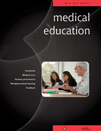
MEDICAL EDUCATION
Advancing Knowledge and Practice in Medical EducationMEDICAL EDUCATION, published by Wiley, stands as a leading journal in the fields of education and medical training, holding a prestigious Q1 ranking in both the Education and Medicine (miscellaneous) categories for 2023. With an impressive impact illustrated by its 94th percentile ranking in Social Sciences Education, this journal has been pivotal in advancing research and discourse since its inception in 1966. Dedicated to enhancing the quality of medical education through scholarly articles, innovative methodologies, and evidence-based practices, MEDICAL EDUCATION provides a vital platform for educators, researchers, and practitioners. Although it does not offer open access, its comprehensive reviews and studies are invaluable resources for those committed to developing effective educational practices in the medical field. This journal is instrumental in shaping the future of healthcare education and fostering knowledge exchange among professionals.
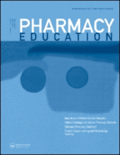
PHARMACY EDUCATION
Cultivating the next generation of pharmacy leaders.PHARMACY EDUCATION, an esteemed journal published by the INTERNATIONAL PHARMACEUTICAL FEDERATION, is dedicated to advancing the field of pharmacy education through high-quality research, reviews, and innovative practices. With an ISSN of 1560-2214 and an E-ISSN of 1477-2701, this journal provides a vital platform for educators, researchers, and professionals to discuss contemporary issues and opportunities within pharmaceutical education. Recognized for its relevance, it holds a Q4 ranking in Education and Q3 in both Pharmaceutical Science and Pharmacy as of 2023. Despite its Scopus rankings reflecting a growing niche, with positions such as 30/45 for Pharmacy in Health Professions, it showcases a commitment to nurturing the next generation of pharmacy practitioners. As a crucial resource for enhancing pharmacy curricula and pedagogical strategies, PHARMACY EDUCATION invites contributions from those dedicated to enriching educational methodologies and promoting excellence in pharmaceutical training. This journal plays an essential role in bridging academic research and practical application, encouraging the ongoing evolution in pharmacy education across the globe.
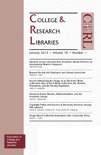
COLLEGE & RESEARCH LIBRARIES
Fostering Collaboration Among Library ScholarsCOLLEGE & RESEARCH LIBRARIES, published by the Association of College & Research Libraries, stands as a pivotal platform in the field of Library and Information Sciences. With an impressive Q1 ranking and a Scopus rank of 78 out of 280, it sits in the 72nd percentile among its peers, reflecting its significant contribution to academic scholarship. The journal, in circulation since 1939 and with *Open Access* status since its inception, is committed to disseminating high-quality research and practical insights for librarians, information professionals, and researchers. Based in the heart of Chicago, the journal provides a comprehensive overview of trends, challenges, and innovations within the library and information sector. Covering a broad spectrum of topics with converged years reflecting a rich historical context (from 1946 to 1947 and from 1987 to 2024), it facilitates discourse among practitioners and scholars aiming to advance the effectiveness of library services. Whether you are a researcher seeking to explore new methodologies or a student striving to stay informed of the latest industry developments, COLLEGE & RESEARCH LIBRARIES is your essential resource.

JOURNAL OF FURTHER AND HIGHER EDUCATION
Leading the Conversation on Educational AdvancementJournal of Further and Higher Education, published by Routledge Journals, Taylor & Francis Ltd, stands as a prominent platform in the field of education, with a distinguished focus on further and higher education studies. With an ISSN of 0309-877X and E-ISSN of 1469-9486, this journal has been contributing invaluable insights since its inception in 1977. The journal boasts a remarkable Q1 ranking in its category for 2023, placing it in the top tier of educational research, underscored by its 83rd percentile ranking among Scopus Ranks in Social Sciences - Education. Researchers and practitioners alike are encouraged to submit their work, as the journal aims to foster innovative discussions and disseminate high-quality scholarly articles that address contemporary challenges in further and higher education. With its commitment to academic excellence, Journal of Further and Higher Education plays a crucial role in shaping policy and practice in the educational landscape, ensuring that the voices of educators and learners are heard and valued.
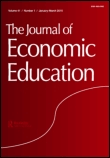
JOURNAL OF ECONOMIC EDUCATION
Innovating Pedagogy in the World of EconomicsJOURNAL OF ECONOMIC EDUCATION, published by Routledge Journals, Taylor & Francis Ltd, serves as a pivotal platform for the dissemination of research in the vital intersection of economics and education. With an ISSN of 0022-0485 and an E-ISSN of 2152-4068, this esteemed journal has been contributing to the field since 1969 and continues to evolve with influential insights projected through to 2024. Ranking in the Q2 category for both Economics and Econometrics, and Education as of 2023, it demonstrates a significant commitment to enhancing educational practices in economics. Researchers and educators alike will find value in its empirical studies, theoretical explorations, and innovative pedagogical approaches. Although currently not offering open access, the journal maintains a competitive reputation with a Scopus rank placing it in the 54th and 47th percentiles across its related fields. Join the scholarly dialogue that shapes the future of economic education and informs teaching methodologies across the globe.

International Electronic Journal of Mathematics Education
Transforming Educational Practices with Rigorous ResearchInternational Electronic Journal of Mathematics Education (IEJME) is a premier platform dedicated to advancing the field of mathematics education through rigorous research and innovation. Published by MODESTUM LTD, this interdisciplinary journal focuses on the pedagogical, theoretical, and empirical aspects of mathematics education, facilitating a deep understanding of teaching practices, learning methods, and curriculum development. With its commitment to open access, IEJME ensures that research findings are accessible to a global audience, fostering collaborative efforts among educators, researchers, and practitioners. The journal has maintained a commendable position in academic rankings, holding a Rank of #114/399 in General Mathematics and #782/1543 in Education within Scopus, highlighting its significant contribution to the scholarly community. By publishing high-quality research from 2009 to 2016 and 2021 to 2024, IEJME continues to serve as an essential resource for those invested in enhancing mathematical understanding in educational contexts, inspiring future generations of mathematicians and educators.
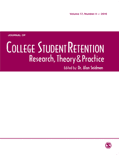
Journal of College Student Retention-Research Theory & Practice
Transforming Theory into Effective Retention StrategiesThe Journal of College Student Retention: Research Theory & Practice, published by SAGE Publications Inc, serves as a pivotal platform for scholars and practitioners in the field of education, particularly focusing on the multifaceted dynamics of student retention in higher education. With an ISSN of 1521-0251 and an E-ISSN of 1541-4167, this peer-reviewed journal, categorized in the Q2 quartile for Education, has established its significance within academic circles, evidenced by its impressive Scopus ranking of 286 out of 1543 in the Social Sciences/Education category, placing it in the top 19th percentile. The journal aims to advance research, theory, and practice addressing student retention challenges, making it a vital resource for educators, administrators, and researchers committed to enhancing student success in colleges and universities. Although not Open Access, the journal's commitment to high-quality scholarship promises that every published article contributes meaningfully to the discourse on effective retention strategies, policy interventions, and innovative practices within the educational landscape.

Canadian Journal of Higher Education
Championing Open Access for All in Higher EducationThe Canadian Journal of Higher Education, published by the Canadian Society for the Study of Higher Education, is a pivotal platform in the field of higher education research. Since its inception in 1971, this Open Access journal has championed the dissemination of innovative and impactful scholarly work that contributes to the understanding and advancement of higher education in Canada and beyond. With a commitment to accessibility, it ensures that researchers, professionals, and students can engage with high-quality research without barriers. The journal serves as a critical resource for those interested in policy analysis, pedagogical practices, and the socio-economic dimensions of higher education, fostering dialogue and collaboration among academics and practitioners. By promoting rigorous and diverse examinations of issues facing post-secondary education, the Canadian Journal of Higher Education plays an essential role in shaping the landscape of academic discourse in this vital field.
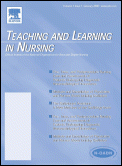
Teaching and Learning in Nursing
Empowering Excellence in Nursing EducationTeaching and Learning in Nursing, an esteemed publication from ELSEVIER SCIENCE INC, serves as a cornerstone for advancing nursing education and practice. With its ISSN 1557-3087 and E-ISSN 1557-2013, this journal offers a platform for the dissemination of innovative research and best practices in nursing. It is recognized for its significant contributions within the categories of Fundamentals and Skills, Leadership and Management, and Research and Theory, consistently ranking within the top quartile in these essential areas for 2023. The journal's strategic focus on enhancing nursing pedagogy makes it an invaluable resource for researchers, educators, and practitioners alike, striving to bridge the gap between theory and application. Although it currently does not offer Open Access, its robust impact factor and critical insights foster a dynamic dialogue within the nursing community, making it a must-read for anyone dedicated to the evolution of nursing education. With an engaging scope that covers the latest trends and challenges in nursing pedagogy, it aims to equip the next generation of nursing professionals with the tools necessary for excellence in patient care and professional leadership. Explore this journal to stay updated on cutting-edge practices and contribute to the collective knowledge in nursing education.